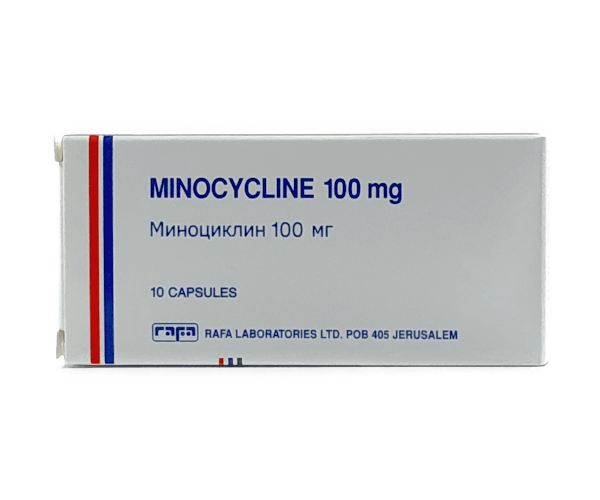Dynacin (generic name: minocycline) is a broad-spectrum antibiotic that is commonly prescribed for various bacterial infections, including acne vulgaris, respiratory tract infections, urinary tract infections (UTIs), and some sexually transmitted infections (STIs) such as gonorrhea.
Minocycline belongs to the tetracycline class. It functions by inhibiting bacterial protein synthesis, thereby preventing the growth and spread of bacteria. Its lipophilic (fat-absorbing) nature enables effective tissue penetration and persistence, making it particularly useful in treating skin and soft tissue infections.
Minocycline works by inhibiting the ability of bacteria to produce proteins that are essential to their survival. Without these proteins, the bacteria cannot grow or multiply. Minocycline can prevent the spread of the infection, allowing the immune system to eliminate the invasive bodies over time.
In dermatology, minocycline is frequently utilized for its anti-inflammatory properties, especially in managing moderate to severe inflammatory acne. Beyond its antibacterial effects, it reduces inflammation, which is beneficial in treating acne lesions. Additionally, minocycline is being widely prescribed off-label as an adjunctive therapy in conditions like rheumatoid arthritis due to its immunomodulatory effects.
Caution
Taking minocycline while pregnant can harm an unborn baby. Fertile women should use an effective form of birth control to keep from getting pregnant. If there are signs of having become pregnant while using this medicine, consult a doctor right away. Note as well that birth control pills may not work as well while being treated with minocycline. Minocycline can also pass through breast milk and cause discoloration a developing infant.
Dosage
It is essential to follow the instructions printed on the label, which are according to the doctor’s presciption. For treating infections, the typical adult dosage of Dynacin is an initial dose of 200 mg, followed by 100 mg every 12 hours. For acne treatment, the dosage may vary based on the severity and response to therapy, often starting at 50 to 100 mg twice daily. It is recommended to take Dynacin with a full glass of water to reduce the risk of irritation in the throat. If a dose is missed, it should be taken as soon as remembered unless it is close to the time for the next dose; in such a case, the missed dose should be skipped. Do not double-dose to make up for a missed dose.
Storage
Dynacin should be stored in the original container between 20-25°C (68-77°F). Keep the container tightly sealed, away from moisture and heat.
This text is for informational purposes only. Please consult a doctor or pharmacist before using any medication.
Read the information leaflet that comes with the medication.
If a sudden allergic reaction (anaphylaxis) occurs after taking Dynacin, with symptoms like swelling of the face, tongue, or throat making it difficult to breathe or swallow, or there is wheezing, hives, rash, blistering, or peeling of the skin, call a doctor or 911 right away, or go to an emergency room immediately.
Most people who use Dynacin do not experience any adverse side effects. Doctors prescribe this medication because they assess the benefits of such treatment outweigh any likely unwanted effects.
Some of the side effects that have been reported include:
-
Gastrointestinal disturbances: Nausea, vomiting, and diarrhea.
-
Central nervous system effects: Dizziness, lightheadedness, and vertigo.
-
Skin reactions: Photosensitivity leading to sunburn-like symptoms upon exposure to sunlight.
-
Discolorations: Long-term use may result in bluish-gray discoloration of the skin, nails, or gums.
Not all side effects are listed here. If these or other unlisted symptoms persist or worsen, consult a healthcare provider or pharmacist.
Dynacin is FDA-approved for treating various bacterial infections, including:
- Acne vulgaris: Characterized by pimples, blackheads, and cysts, often on the face, chest, and back.
- Respiratory tract infections: Such as pneumonia and bronchitis, presenting with symptoms like cough, fever, and difficulty breathing.
- Urinary tract infections (UTIs): Symptoms include frequent urination, burning sensation during urination, and lower abdominal pain.
- Sexually transmitted infections (STIs): Including chlamydia and gonorrhea, which may cause genital discharge and discomfort.
Off-label uses of minocycline encompass treatment for rheumatoid arthritis, due to its anti-inflammatory properties, and skin conditions like rosacea. In rheumatoid arthritis, patients often experience joint pain, swelling, and stiffness, which minocycline may help alleviate.













